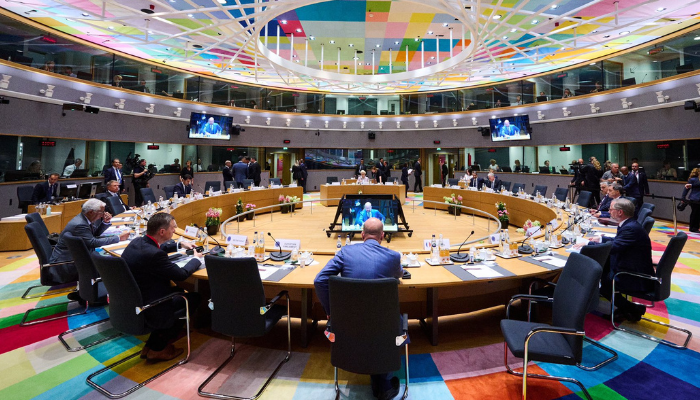
In what the European Council president, President Charles Michel, called a “historic moment,” the announcement was made after discussions among leaders of the EU’s 27 member states during a summit Thursday in Brussels.
The European Commission had, last week, recommended that Ukraine should be granted candidate status to pave way for the country’s membership of the bloc. The commission’s president, Ursula von der Leyen, had said Ukraine had “already implemented roughly 70 per cent of rules, norms and standards.”
In a statement approving the candidate status, The European Council said, “The European Council recognises the European perspective of Ukraine, the Republic of Moldova and Georgia. The future of these countries and their citizens lies within the European Union.
“The European Council has decided to grant the status of candidate country to Ukraine and to the Republic of Moldova.
“The Commission is invited to report to the Council on the fulfilment of the conditions specified in the Commission’s opinions on the respective membership applications as part of its regular enlargement package. The Council will decide on further steps once all these conditions are fully met.”
The European Council added that, “The progress of each country towards the European Union will depend on its own merit in meeting the Copenhagen criteria, taking into consideration the EU’s capacity to absorb new members.”
Announcing the development, an excited European Commission tweeted to its verified Twitter page, @EU_Commission, “Today is a good day for Europe! Ukraine and Moldova are granted the candidate status to become part of the European family. Georgia is given the perspective to become a member of the EU.”
In a series of tweets posted to her verified Twitter page, @vonderleyen, after the announcement, European Commission president, Ursula von der Leyen, congratulated Ukrainian president Volodymyr Zelensky, President of the Republic of Moldova, Maia Sandu, and Prime Minister of Georgia, Irakli Garibashvili, saying “Your countries are part of our European family.”
Ursula von der Leyen wrote, “Today is a good day for Europe. Congratulations to President @ZelenskyyUA, President @Sandumaiamd and Prime Minister @GharibashviliGe. Your countries are part of our European family. And today’s historic decision by Leaders confirms that.
“Very pleased with the Leaders’ endorsement of our Opinions. (Ukraine, Moldova and Georgia) all have work to do before moving to the next stage of the process. I know that they will move swiftly. They know how crucial this is for their democracies, their economies and their citizens.
“This decision strengthens us all. It strengthens Ukraine, Moldova and Georgia, in the face of Russian imperialism. And it strengthens the EU. Because it shows once again to the world that we are united and strong in the face of external threats.”
French President, Emmanuel Macron, reacting to the announcement via a tweet, said, “In Kyiv last week, we made a commitment: to work towards offering Ukraine the status of candidate for membership of the European Union. Here we are. Tonight we open a new stage for Ukraine, for Moldova, for Europe. It’s historic.”
Reacting, Ukrainian President Zelensky tweeted, “Sincerely commend EU leaders’ decision at #EUCO to grant Ukraine a candidate status. It’s a unique and historical moment in Ukraine-EU relations. Grateful to @CharlesMichel, @vonderleyen and EU leaders for support. Ukraine’s future is within the EU. #EmbraceUkraine“
The Kyiv Independent also quoted Zelensky as saying, “It’s a victory. Now, we will defeat the enemy, rebuild Ukraine, become a EU member state, and then – we will finally rest.”
What a candidate status means for Ukraine
It is a first official step to EU membership.
There are three stages involved in the process of becoming a full member of the European Union:
- When a country is ready it becomes an official candidate for membership (which Ukraine has become today)– but this does not necessarily mean that formal negotiations have been opened.
- The candidate moves on to formal membership negotiations, a process that involves the adoption of established EU law, preparations to be in a position to properly apply and enforce it and implementation of judicial, administrative, economic and other reforms necessary for the country to meet the conditions for joining, known as accession criteria.
- When the negotiations and accompanying reforms have been completed to the satisfaction of both sides, the country can join the EU.
Although candidate status is not membership yet, it does carry major cachet. For countries aspiring to be part of Europe’s most important political and economic bloc, candidate status amounts to a first seal of approval.
Naming Ukraine as a candidate country would also send a strong signal to Russia — that the EU won’t be intimidated by Moscow and is ready to welcome Kyiv as a member, according to Politico.





